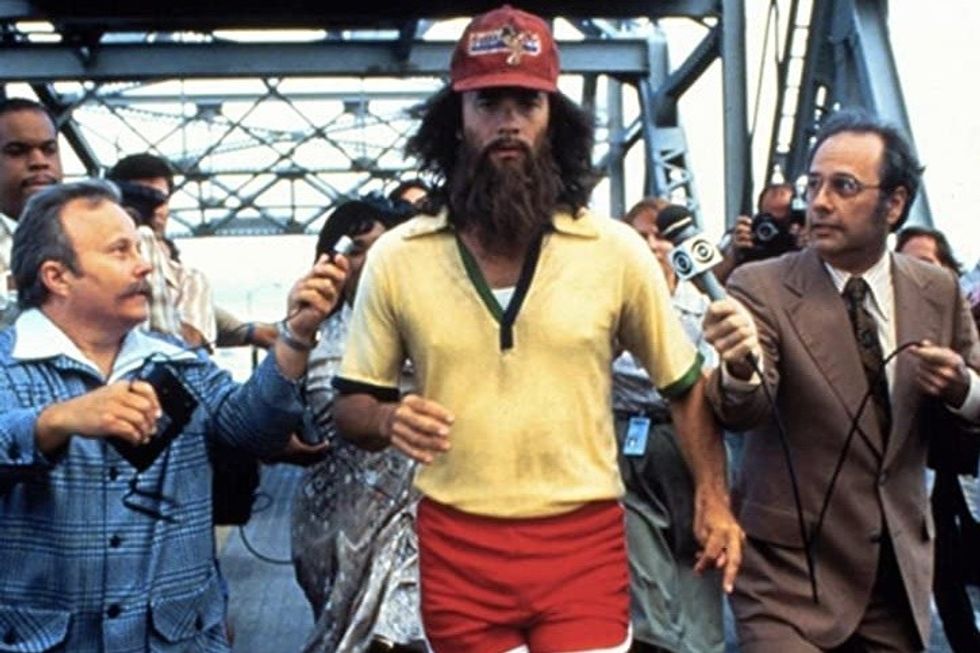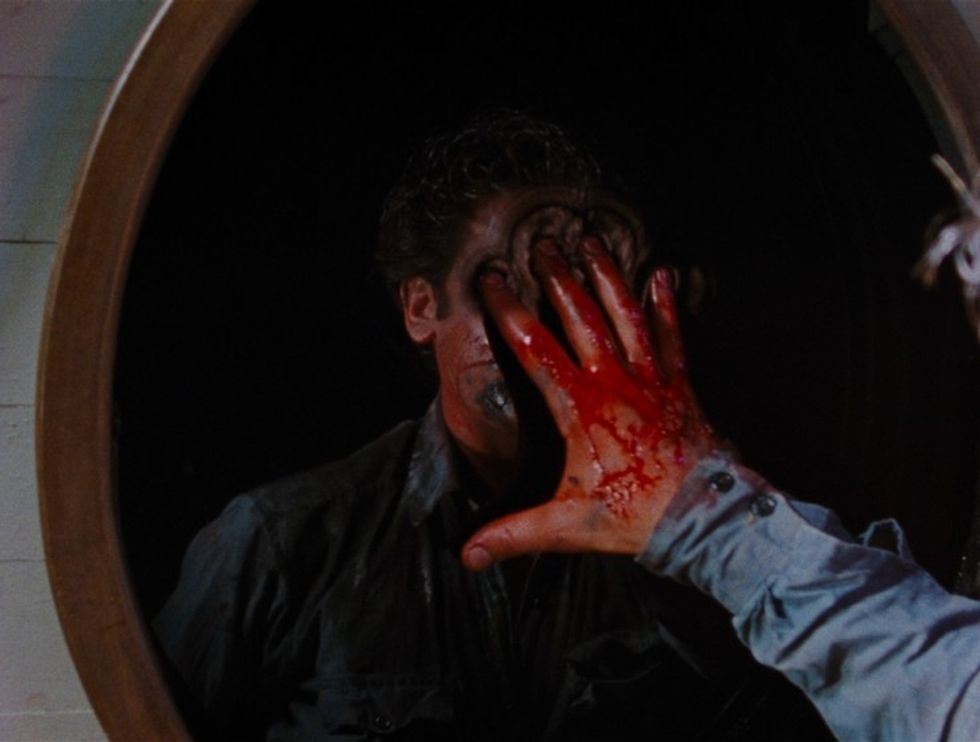
Movies have the power to transport us to different worlds and immerse us in unique experiences. But where do these ideas come from? For filmmakers and screenwriters, coming up with a compelling movie concept can be a daunting task.
Sometimes, the best approach is to think outside the box and seek inspiration from unconventional sources. In this article, we’ll explore some creative ways to generate fresh and unique movie ideas.
From adapting from other media to exploring personal experiences and embracing the absurd, these approaches can help you break out of your creative rut and come up with a truly original movie concept.
Let’s dive in.
 ‘Forrest Gump’
‘Forrest Gump’
Credit: Paramount Pictures
What Are Some Ways To Come Up With Movie Ideas?
Coming up with movie ideas is not easy. Sometimes, you have to break away from the norm and think outside the box.
Here are some ways:
- Draw inspiration from real-life events: You can get movie ideas by looking for unique or unusual stories that have happened in the past. These stories could be from news articles, biographies, or historical events.
- Explore your dreams: Dreams can be a great source of creative inspiration. Try keeping a dream journal and jot down your dreams, then see if you can extract any interesting or unique concepts to turn into a movie idea.
- Brainstorm with others: Collaborating with others can help spark new ideas. Consider hosting a brainstorming session with friends or colleagues to come up with fresh movie concepts.
- Combine genres: Try combining two or more genres to create something new and unique. For example, a horror-comedy or a romance-drama.
- Use visual inspiration: Look for inspiration in visual media such as paintings, photographs, or even architecture. Let the visual elements guide your imagination and help you generate new movie ideas.
- Adapt from other media: Adaptations from other media such as books, plays, or video games can be a great source of inspiration for movie ideas. Look for stories that have a unique perspective or a strong fanbase.
- Write about personal experiences: Personal experiences can be a great source of material for movies. Think about events in your life that have been particularly meaningful or challenging and try to turn them into a compelling story.
- Think about current events: Movies that tackle current events can be powerful and relevant. Look for topics that are currently making headlines and see if you can turn them into a movie idea.
- Experiment with different formats: Try experimenting with different formats such as found footage, mockumentaries, or non-linear storytelling. These techniques can help you create a unique and memorable movie concept.
- Embrace the absurd: Don’t be afraid to embrace the absurd or the surreal. Sometimes the most outlandish concepts can be the most memorable and impactful.
 ‘The Evil Dead’
‘The Evil Dead’
Credit: New Line Cinema
More Ways To Come Up With Movie Ideas
Tried and True Techniques
- “What if?” Scenarios: Start with a simple question.
- What if a group of friends found a time machine?
- What if your pet could talk for one day?
- What if the world suddenly lost gravity?
- Twist on a Familiar Story: Take a classic tale or movie and give it a new spin.
- Cinderella as a sci-fi space opera.
- A gender-swapped version of a beloved rom-com.
- Snow White as a horror movie.
- The Mash-Up: Combine two genres or contrasting ideas that don’t normally go together.
- Western heist film.
- Romantic comedy with zombies.
- Space travel documentary as a musical.
- The News Headline: Grab inspiration from a current event or bizarre news story and make it the basis for a plot.
Where to Look for Inspiration
- Personal Experiences: Mine your own life! Memorable events, relationships, dreams, fears…all potential movie material.
- History: Dig into fascinating historical events, figures, or forgotten time periods.
- Books, Short Stories, and Comics: Find stories that pique your interest and imagine how they’d translate to the screen. Adaptations can be fantastic sources of movie ideas.
- Mythology and Folklore: These tales offer time-tested narratives and fantastic elements.
- Your Community: Observe people around you, their quirks, and the little dramas of everyday life.
Tips to Enhance the Process
- Freewriting: Set a timer for 10 minutes and just write. Don’t worry about grammar or making sense, just let ideas flow.
- Mind Mapping: Start with a central concept and branch out, adding associated words, characters, and plot points.
- Don’t be afraid of ‘bad’ ideas: A silly spark might ignite a unique concept down the road.
- Collaborate: Brainstorming with a friend or writing partner can open new avenues of creativity.
- Keep a Notebook/Idea File: Always be ready to document those flashes of inspiration.
Mapping Out Your Movie Idea
There are a lot of different ways yo mpa out your idea once you have it. Let’s take a peek at a few:
- The Outline: A classic way to structure your story.
- Pros: Provides a clear linear progression of events and helps organize your thoughts.
- Cons: Can be limiting if your story isn’t rigidly structured.
- Structure:
- Act I: Setup (Characters, setting, inciting incident)
- Act II: Confrontation (Obstacles, rising tension, key plot points)
- Act III: Resolution (Climax, resolution of conflicts)
- The Treatment: A more detailed summary than an outline, focusing on characters and key scenes.
- Pros: Gives a better sense of the story’s overall tone and emotional beats.
- Cons: Still a text-heavy method and might not be the best for visual thinkers.
Visual Methods
- Storyboard: Comic-strip style breakdown of major scenes, focusing on visuals and camera angles.
- Pros: Great for action-heavy or visually driven movies, helps with cinematic flow.
- Cons: Can be time-consuming if you’re not artistically inclined.
- Index Cards: Each card represents a scene. Write a brief description, then organize and reorganize as needed.
- Pros: Tactile, easily rearrangeable for flexible plotting.
- Cons: Doesn’t provide much space for extensive detail.
- Mind Mapping: Start with your central idea, then branch out to characters, setting, themes, and plot points.
- Pros: Allows for free-flow of ideas and seeing connections easily.
- Cons: Can become chaotic if your idea is especially complex.
Software-Based Methods
- Screenwriting Software: Programs like Final Draft or Celtx offer built-in templates for outlines, beat sheets, and even index cards.
- Pros: Streamlined process, professional formatting options.
- Cons: Can have a learning curve, some paid options.
Choosing the Right Method
- Think about your style: Are you a visual thinker or prefer text-heavy outlining?
- Complexity of your idea: Simple stories might work with index cards, while complex plots may need more detailed outlining.
- Don’t be afraid to combine: Start with a mind map, then expand key points into an outline!
Summing Up Some Ways To Come Up With Movie Ideas?
Coming up with a movie idea that is fresh and unique requires a willingness to think outside the box. By drawing inspiration from unconventional sources such as personal experiences, current events, and even dreams, you can create a movie concept that stands out from the crowd.
Collaborating with others, experimenting with different formats, and embracing the absurd can also help you generate new and exciting ideas. Whether you’re a seasoned filmmaker or a first-time screenwriter, these approaches can help you break through creative blocks and create a truly original movie concept.
So go forth, get inspired, and let your imagination run wild!
Worst case scenario, you can always pace in the shower.
Author: Jason Hellerman
This article comes from No Film School and can be read on the original site.
